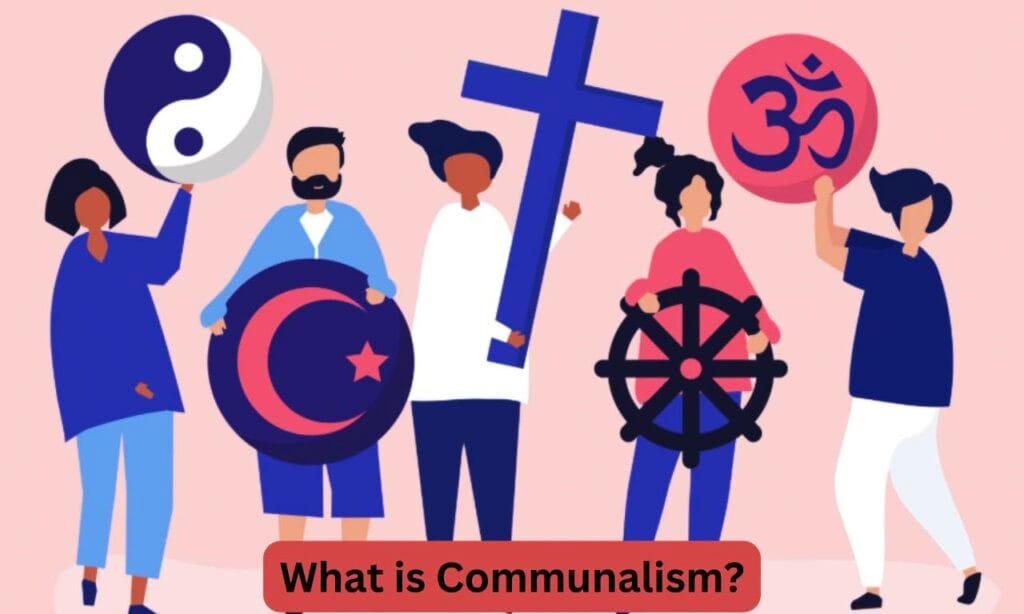
Communalism : Meaning
Communalism refers to a socio-political ideology that emphasizes the interests of a particular religious, ethnic, or social group, often to the exclusion or detriment of other groups. It is based on the idea that people in a community are united by common religious or ethnic ties, and it often leads to the promotion of group identity over national unity.
Communalism is typically characterized by:
- Exclusive Group Identity: Prioritizing the interests of one religious or ethnic group over others.
- Sectarian Divisions: Fostering division and hostility between different communities.
- Political Mobilization: Using religious or ethnic identity as a tool for political mobilization, often leading to violence or conflict.
Communalism is particularly evident when religion or ethnicity is used to drive political agendas, and it has played a divisive role in several societies, including India, Sri Lanka, and parts of Africa and the Middle East.

Rise of Communalism as a Ruling Ideology
- Colonial Legacy:
- Communalism often gained prominence in colonial contexts, where ruling powers used divide-and-rule tactics to maintain control. In countries like India under British rule, policies emphasized religious and ethnic differences to prevent unity among the colonized population.
- Colonial powers institutionalized communal identities through separate electorates and legal systems, which encouraged divisions between communities (e.g., Hindus and Muslims in India).
- Post-Colonial Nationalism and Communal Politics :
- After the end of colonial rule, many newly independent countries faced internal divisions along communal lines. Political parties and leaders often mobilized people based on their religious or ethnic identities to gain political power.
- In India, the Partition of 1947, which divided the country along religious lines (Hindu-majority India and Muslim-majority Pakistan), was a direct consequence of communalism as a political force. The violence and mass displacement during Partition solidified communal divisions.
- Religious and Ethnic Nationalism :
- In some cases, communalism has risen as a response to perceived threats to the identity of a particular community. For example, in India, the rise of Hindutva, a form of Hindu nationalism, has positioned Hindu identity at the center of political discourse, leading to tensions with minority communities.
- Similar forms of communalism can be seen in Sri Lanka (Sinhalese-Buddhist nationalism) and various African countries, where ethnic divisions have led to violence and conflict.
- Global Influence of Identity Politics :
- With globalization and political changes, many communities have increasingly turned to identity politics to assert their rights and resist marginalization. In some countries, this has led to the rise of communalism, as groups seek to preserve their cultural or religious distinctiveness in the face of perceived homogenization.
- Political Manipulation and Populism :
- Communalism has often been used by populist leaders to rally mass support by appealing to religious or ethnic loyalties. In many cases, political parties or movements use communal rhetoric to gain votes by promising to protect the interests of a particular group, often leading to polarization and conflict.
Decline of Communalism as a Ruling Ideology

While communalism has had a significant impact on political systems, it has seen a decline in many contexts due to the following reasons:
- Secularism and National Unity :
- Many countries have embraced secularism as a principle to counter communalism. Secularism seeks to separate religion from politics and promote unity across diverse communities. In India, for instance, the post-independence leadership, under figures like Jawaharlal Nehru, promoted secularism to prevent the dominance of any one religious group.
- The push for national unity over narrow communal identities has been key in diminishing the political influence of communal ideologies.
- Economic Modernization :
- Economic development and modernization often lead to a decline in communalism, as people become more focused on economic progress and individual aspirations rather than religious or ethnic divisions.
- As societies become more integrated into the global economy, communal loyalties may take a backseat to concerns about employment, education, and economic opportunity.
- Democratic Institutions :
- The establishment of strong democratic institutions has helped to reduce the influence of communalism in many countries. Democracies that uphold the rule of law, minority rights, and equal representation tend to reduce the space for communal divisions.
- Legal frameworks that promote equal rights for all citizens, regardless of their religious or ethnic background, have diminished the political influence of communal ideologies.
- Civil Society Movements :
- Civil society movements have played a significant role in countering communalism by advocating for social harmony, religious tolerance, and peaceful coexistence. Human rights organizations, peace activists, and secular groups have worked to bridge communal divides and reduce the appeal of sectarian ideologies.
- In some countries, these movements have been successful in promoting inter-community dialogue and reducing communal tensions.
- Globalization and Cultural Exchange :
- Globalization has led to increased cross-cultural interactions, reducing the isolation of religious and ethnic communities. As people are exposed to different cultures, traditions, and religions, the narrow-minded view of communalism often loses its appeal.
- The spread of global values like human rights, democracy, and multiculturalism has helped challenge communal ideologies.
- Backlash against Violence :
- Communalism often leads to violence, such as riots, pogroms, and even civil wars. As societies experience the devastating effects of communal violence, there is often a public backlash against the divisive ideologies that fuel these conflicts.
- The desire for peace and stability can lead to a rejection of communal politics, as seen in post-conflict societies.
- Legal and Constitutional Protections :
- Many countries have enacted laws to counter communalism, such as anti-hate speech laws, equal rights amendments, and constitutional protections for minority communities.
- These legal frameworks can curb the influence of communalism by penalizing discrimination and promoting equal representation in government and society.
Challenges to the Decline of Communalism
- Resurgence of Identity Politics : Despite efforts to counter communalism, it can resurface during times of social or economic crisis, when communities feel threatened or marginalized. Politicians may exploit communal sentiments for electoral gain.
- Polarization in Modern Democracies : Even in modern democratic systems, there can be a resurgence of communal rhetoric, particularly in times of political polarization or populist movements.
Conclusion
Communalism, as a ruling ideology, has historically thrived in contexts of division, insecurity, and political manipulation. However, its decline in many regions has been driven by secularism, modernization, economic progress, and democratic reforms. While communalism may still persist in some areas, the long-term trend is towards the reduction of its influence, as more inclusive and pluralistic political systems take hold.
